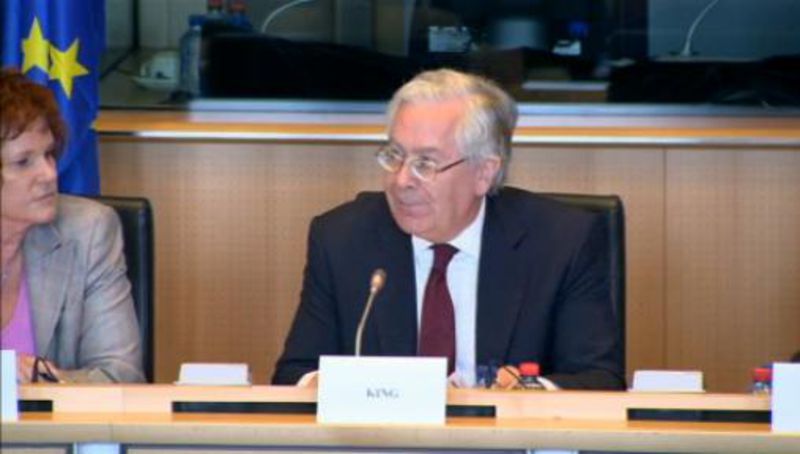IMF to Take Over Global Economic Governance
Adelina Marini, September 25, 2011
 Three years ago, at the G20 summit in Pittsburgh, it was finally acknowledged that the G20 was the new global format. Thus the death of the G7 was announced, as the group defining global agenda for the only reason that it consisted of the seven most economically developed countries. In 2009, a year after the bankruptcy of the Lehman Brothers that marks the beginning of the financial crisis, compared only to the Great Depression from the 20-ies of last century, the leaders of the twenty economies with the biggest potential and influence in the world were already aware what was wrong.
Three years ago, at the G20 summit in Pittsburgh, it was finally acknowledged that the G20 was the new global format. Thus the death of the G7 was announced, as the group defining global agenda for the only reason that it consisted of the seven most economically developed countries. In 2009, a year after the bankruptcy of the Lehman Brothers that marks the beginning of the financial crisis, compared only to the Great Depression from the 20-ies of last century, the leaders of the twenty economies with the biggest potential and influence in the world were already aware what was wrong.
It's the globalisation, stupid!
Globalisation, which was until recently interpreted in the international and national narrative only in its two extreme dimensions - a panacea for all economic problems, because it provides a lot of freedom for the development of entrepreneurial thought and, accordingly - as a leprosy for national politics, as it undermines politicians' efforts to fight unemployment and the withering economic potential. And precisely the completed first phase of globalisation has led to the necessity any decisions aimed at overcoming global challenges to be taken via coordinated actions with the rest of the partners.
A lot of measures have been outlined, many of which indeed very ambitious, but the results so far are insignificant.
G20 should hand over global governance
In this context three former influential leaders-socialists united their efforts to  call for global governance, very similar to the efforts currently being invested in the European Union and the eurozone in particular for reforming the European economic governance, with a focus on the creation of an independent and centralised body, not as it was until recently governance to be left in the hands of the participants themselves.
call for global governance, very similar to the efforts currently being invested in the European Union and the eurozone in particular for reforming the European economic governance, with a focus on the creation of an independent and centralised body, not as it was until recently governance to be left in the hands of the participants themselves.
In a joint article former British PM and long-serving minister of finance Gordon Brown, the former Spanish PM, considered to be the author of the economic success of Spain in the 90-ies, Felipe Gonzalez, and not the less famous former president of Mexico, Ernesto Zedillo, also popular with his economic reforms, point out that after the initial excitement over the rising of the G20 as a major global factor, now we are facing a lack of strong economic growth and a danger of a new recession for the developed economies, as well as a potential for a new global financial crisis. In other words, G20's mission from 2009 is failing, the three former leaders think.
The reform of the financial system that had to be done in a coordinated manner is currently being done unilaterally. The only well coordinated decision is the introduction of stricter capital rules, Basel III, which also have a lot of holes. The transformation of Bretton Woods [IMF, World Bank, etc.] has not moved at all, and the Doha Round [a round of negotiations for trade liberalisation] has turned much more into a zombie than the G20 was willing to recognise before.
 The ideas from Pittsburgh are about to fail given the way the leaders intend to implement them. The IMF was given consulting and secretariat functions, while it should have been vice versa, Brown, Gonzalez and Zedillo write. The peer-reviews had proved to be ineffective and this created the need of an independent agent that can be burdened with the task to find evidence, to diagnose and offer various solutions which then to be discussed by the G20 leaders, is the idea of the three. And this institution has to be the IMF.
The ideas from Pittsburgh are about to fail given the way the leaders intend to implement them. The IMF was given consulting and secretariat functions, while it should have been vice versa, Brown, Gonzalez and Zedillo write. The peer-reviews had proved to be ineffective and this created the need of an independent agent that can be burdened with the task to find evidence, to diagnose and offer various solutions which then to be discussed by the G20 leaders, is the idea of the three. And this institution has to be the IMF.
It is obvious that the three former leaders have learnt some lessons from the problems in the euro area, where there is a single currency, a common market but separate political decisions which led to tectonic imbalances, threatening to break up one of the biggest success stories of European integration - the eurozone - and even the visa-free area of Schengen. As I mentioned above, globalisation is a process that has proved that there cannot be global economy unless there is global governance. Because in a global perspective, the world financial and economic crisis showed the same symptoms as in the euro area - imbalances and narrow national interests that undermine the joint efforts which benefit everyone.
But to what extent do the authors have grounds to think that whatever reform of the IMF would make any sense given the scandal with the previous Managing Director of the Fund, the French Dominique Strauss-Kahn, removed from the post for allegations of sexual harassment that were not proved. His place was taken by another French - the influential and very strong minister of finance, Mme Christine Lagarde, whose chair, however, is also shaking on a national level. Stronger and stronger are growing the pretences of global powers like China, Brazil and India, who think they have already deserved the right to have a stronger voice in global governance. Next year there will be a change of leadership in another global institution from the set agreed in Bretton Woods - the World Bank, managed by the unwritten rules by an American.
So, although it deserves a thorough analysis, the idea of Gordon Brown, Felipe Gonzalez and Ernesto Zedillo seems hard to be realised. It is a fact, however, that the G20 is the format that should not be left to die. And this fact is being recognised massively. Last was American President Barack Obama who, from the podium of the General Assembly of the UN, said on September 21st that coordinated actions were needed in the G20 so that the fragile global growth is tackled. Mr Obama said this after individual meetings in the framework of the Assembly with the leaders of  France, Britain and Japan. "G20 has to be a forum for people to come together and take coordinated action", Reuters quoted the American president as saying.
France, Britain and Japan. "G20 has to be a forum for people to come together and take coordinated action", Reuters quoted the American president as saying.
We in euinside also wrote recently that in these turbulent times there had to be an emergency summit of the Twenty. Something of which also called the leader of the opposition Labour party in Britain, Ed Miliband. He too used terms very popular currently in the euro area by saying: "We cannot go on like this. The international community needs to start speaking with one voice and fast".
The regular G20 summit is to take place in November in Cannes. Mr Miliband, though, thinks that it should not be waited until November. Especially in a situation where markets' hysteria threatens to lead to indeed extreme consequences that will additionally complicate the already grim economic situation, but the political too. The big economies are suffocating with lack of economic growth and heavy debt burdens, ageing populations and tensed social systems. Nevertheless, the just awakened for democracy peoples in the Middle East and North Africa continue to watch precisely to these nations hoping to find there decent jobs and good standard of living.
This only enhances social tensions, which have already broke out unexpectedly in Norway and Britain. So, indeed, the G20 has to gather sooner than November, when they will again have to tackle consequences instead of facing them prepared.
 | © European Union
| © European Union | © European Union
| © European Union | © null
| © null